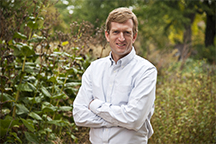Ag Research Spotlight: Jeffrey Dukes
08-01-2016
I want to help to make sure that we pass along the best planet possible to future generations. I think it's critical that we understand that planet well to manage it in a responsible and respectful way." -Jeffrey Dukes, Professor of Forestry and Natural Resources
The Ag Research Spotlight shines each month on an individual whose work reflects our commitment to the six strategic themes that guide Agricultural Research at Purdue. Our spotlight for July 2016 underscores the theme, "Strengthening ecological and environmental integrity in agricultural landscapes."

THE RESEARCHER: Jeff Dukes grew up in and around Palo Alto, California, where camping and backpacking nourished his love of the outdoors. An undergraduate course at Brown University introduced the biology major to how ultraviolet radiation affects plants. "This was a time when a lot of people were worried about the thinning ozone layer," he recalls. "It was amazing to me that we as a single species were changing the atmosphere so much." After graduating from Brown, he worked in a forestry laboratory at North Carolina State University for two years. By the time he chose Stanford University for doctoral research—one of few graduate ecology programs focusing on global environmental changes at that time—the Montreal Protocol on Substances that Deplete the Ozone Layer was in place, but "people started to recognize other changes that hadn't been discussed as much," he notes. Dukes zeroed in on how changes in climate and the atmosphere affect invasive species. He then completed two postdoctoral fellowships, at the University of Utah and Carnegie Institute for Science housed at Stanford. He came to Purdue in August 2008 after spending four years on the faculty at the University of Massachusetts Boston. "Purdue does interdisciplinary science well," he says. "Global environmental change science spans the disciplines of science, but also policy. We have resources here for people to do great things working in those areas."
THE RESEARCH: "I try to understand how people are affecting ecosystems and what the consequences of the ecosystem responses would be," Dukes says. By studying the winners and losers in those ecosystems—and how changes in ecosystems affect the rate of environmental changes—scientists can better predict how the world is going to change going forward, he adds.
FUTURE GENERATIONS: Many people don't understand the impact of current decision-making on the future, Dukes says. "The same heat-trapping, climate-changing gases that we're putting in the atmosphere today will be there in 10,000 years," he says. "What that means is that anything we do today to minimize changes in the atmosphere now is going to have tremendous benefits for thousands of years and many, many generations to come."
LEADERSHIP AND COLLABORATION: Dukes directs the Purdue Climate Change Research Center, a collaborative hub for interdisciplinary research, and the Boston-Area Climate Experiment, in which many other laboratories collaborate to characterize ecosystem responses to gradients of climate change. And as head of the INTERFACE research coordination network, he convenes meetings with scientists around the world to advance global environmental change research. Away from the lab, Dukes enjoys time with his wife and children, ages 12 and 10, photography, ultimate Frisbee, and trips that taking him hiking, kayaking, and canoeing in natural areas. He also admits to being "a bit of news junkie."
https://ag.purdue.edu/arp/Pages/Spotlight-Dukes.aspx#.V588PJNHD5E